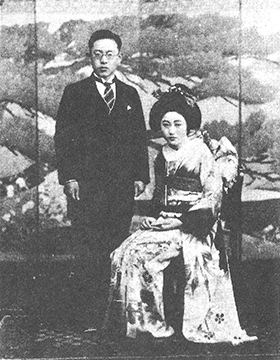When I was a university student in Tokyo, I lived at the dormitory of the Inoue Scholarship Foundation in Otsuka, Bunkyo Ward. A traditional hand-drum master, who was later designated as a living national treasure, lived nearby. I would occasionally greet him and his family on my way to and from the university. Gradually we became so familiar that they would invite me into their house.
When I told them that I got a job and would move to Osaka, the wife offered to introduce her niece as a potential marriage partner. I had been thinking about getting married after getting a job, so I accepted. When we met, I liked her right away. She seemed good-natured and healthy.
 Wedding photo
Wedding photo
Sumiko had just graduated from Oin Junior and Senior High School. Although we soon decided to marry, we didn’t have our wedding until two years later because my older brother became very ill and I supported him with part of my salary. We exchanged letters throughout that period.
We had our wedding ceremony at Gajoen in Meguro, Tokyo, on December 28, 1936. I was 27 and my wife 20. Our new home was a rental in Mukogawa (Amagasaki City, Hyogo), which cost 25 yen a month. Monthly living expenses were about 20 yen at the time, so my monthly salary of 100 yen was enough for us.
I have always loved sweet bean paste dumplings since I was a child, and I often bought them on the way home when we were newly married. I always got 20 for 2 sen apiece at the sweet shop near Mukogawa Station. Since I got hungry before reaching home, I would buy a sweet bean bun for 2 sen at a station along the way and ate it while standing.
I often got home late when newlywed because I had to attend banquets where Managing Director Hori entertained guests. I did miscellaneous tasks like talking to the head hostess ahead of time about the seating order, what dishes would be served, and which geisha would sing and dance. When the banquet started, I drank a cup of sake instead of Mr. Hori, who couldn’t drink. After a while, I went alone to a small room by the entrance.
Sometimes the geisha would take pity and bring me some sake, but I couldn’t drink it since I had things to do until the end of the banquet. The chef’s wife would warn me too, “Mr. Miyazaki, you mustn’t drink any alcohol.”
When I heard them say “The customers are leaving!” I hurried to the entrance to put the shoes in order, guide the cars, and escort everyone out. I had to be very careful not to make any mistakes when ordering the cars.
Speaking of which, there one time when a company attorney was invited to a traditional restaurant in Kita-Shinchi, Osaka, but the car that I ordered didn’t show up after the banquet was over. I complained to the proprietress about the restaurant’s negligence. When I arrived at the office the next morning, the section chief yelled at me, “You’re fired!”
I had no idea why he was so angry at first, but it turned out that the proprietress whom I had complained to the night before knew the President, so the section chief was trying to avoid trouble. He told me to apologize to the proprietress, but I refused since I hadn’t done anything wrong.
Managing Director Hori about it and he asked me to explain what happened. He listened quietly and said he would speak to the President. I later heard that the President laughed and said, “The proprietress was at fault, so it was only natural for Miyazaki to complain.”
When I finished seeing off the guests and executives after a banquet, I always went to the same bar by myself to drink a 50-sen beer. That beer tasted better to me than the expensive sake at the restaurant. On the way home, I often bought cucumber sushi to take home and eat together with my wife. No matter how late I was, she always waited up for me.
There was no secretarial department back then, so I did all the secretarial tasks as well. One job was to buy train tickets. This may sound easy, but actually it wasn’t. The executives would often plan to depart for Tokyo after a meeting or after a banquet, but the meetings and banquets didn’t always end on schedule.
Although I would buy tickets for the specified time, if the meeting or banquet dragged on until close to the departure time, I would be told to change the ticket to the next train. But by that time there might not be any seats left on the next train. So I kept an eye on how the meeting or banquet was going, and if necessary I changed tickets without waiting to be told to.
Nobody taught me how to do this. I just had to imagine myself in the other person’s position, and think of what to do. Secretarial tasks require what you might call “reason beyond reason,” so it was good training for me.

